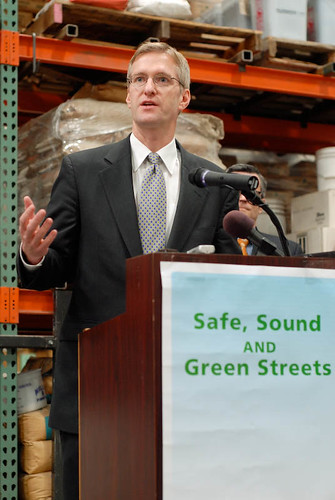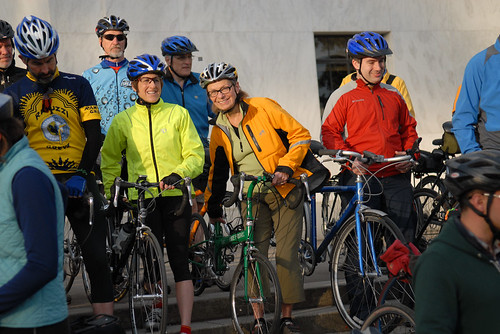Former Oregon Treasurer Ted Wheeler has reported raising almost 15 times as much money as his closest competitor in the race to be Portland’s next mayor.
Among his donors are a wide variety of real estate businesses and Paul Romain, the oil and gas station lobbyist who’s threatened to kill the 10-cent local gas tax increase that Wheeler supports.
Multnomah County Commissioner Jules Bailey, the second-biggest draw for donors, has brought in $26,886 since just before declaring his candidacy, compared to Wheeler’s $398,509.
The race’s newest candidate, Portland State University scholar Sarah Iannarone, has brought on a campaign manager, so presumably aims to raise money. But she hasn’t been in the race long enough to hit a 30-day fundraising report deadline.
Of the other three registered candidates, only David Schor has reported any campaign finances at all, mostly loans from himself. Bim Ditson and Philip Davis haven’t reported anything.
Part of the reason for Wheeler’s lead is that he’s had longer to raise money. But Wheeler has reported $74,542 raised in 2016 alone, triple Bailey’s four-month total.
Another reason Wheeler is ahead: Bailey, who started more than $200,000 behind Wheeler in fundraising, capped donations at $250.
The donor lists give a sense of the people who have been shaping the candidates’ internal narratives about what is important to the future of Portland, and who will presumably have access to whatever candidate takes office.
The primary is May 17. If no candidate gets more than half the vote, it’ll head to November’s general election.
These figures, reported via the Oregon Secretary of State’s ORESTAR political data site (and also explored last week by KGW), include both cash donations and in-kind contributions like free food or venue space.
Money isn’t everything in Portland politics. In 2004, former Police Chief Tom Potter beat former City Council member Jim Francesconi despite being outspent 15-1.
But Wheeler’s lead is immense, and could reflect the way Bailey was quoted as describing his candidacy when he started discussing it publicly: not as a quest to accomplish any particular goals but as a way to prevent “one candidate running.”
Wheeler gets backing from transit-related union, gas station lobbyist
For Portlanders who care about transportation, the race is important because the next mayor will choose the next transportation commissioner and probably also shape the citywide debate over transportation funding. Wheeler has said he’d assign himself the transportation bureau and put it through a major overhaul.
We have yet to hear much from any candidate specifically about biking issues, though Wheeler held an early meeting with biking advocates to start educating himself about the subject.
Advertisement
The campaign finance totals are relevant in another way: the donor lists (here’s Wheeler’s; here’s Bailey’s) give a sense of the people who have been shaping the candidates’ internal narratives about what is important to the future of Portland, and who will presumably have access to whatever candidate takes office.
In Wheeler’s case, there are a few people with ties to the transportation world, like the International Brotherhood of Electrical Workers Local 48. The union, a major political player in the region for decades because its members automatically pay a dues surcharge for political contributions, has been a big backer of pro-light-rail and streetcar candidates. IBEW 48 is one of Wheeler’s four biggest donors with $10,000 in his race.
Another Wheeler backer: Paul Romain, the lobbyist for local gas stations who this month vowed a fight against the city’s proposed gas tax. Interestingly, Romain personally gave Wheeler $1,000 and had his company pay the $400 bill at a Wheeler event just two weeks after Wheeler announced on the first day of his campaign that he supported a city gas tax.
A few other Wheeler donations stand out. For example, Lani McGregor, co-owner of Bullseye Glass, gave $750 to Wheeler in two individual contributions two weeks before the Mercury reported that Bullseye was suspected of legally emitting dangerous levels of arsenic and other heavy metals. (According to the Mercury, Bullseye said it was “not aware of potential emissions” until it learned about them from the newspaper’s reporter. After that, it suspended emissions of the two highest-profile polluting metals, arsenic and cadmium.)
Neither McGregor or anyone else listing an affiliation with Bullseye is on record with ORESTAR as having contributed to any other Oregon political campaign.
Overwhelmingly, though, Wheeler’s donors come from the group whose fortunes are most dramatically made and lost based on city decisions: the real estate industry. Developer Junki Yoshida has given him $10,000. Wheeler’s taken $5,000 each from the local Realtors’ group, Pearl District/South Waterfront developer Homer Williams, Mark Madden of WDC Properties, Richard Clark of Coaster Properties, Harsch Investment Properties Management and Walsh Construction CEO Bob Walsh.
Many other real estate property managers and developers are smaller donors, as are people of many other backgrounds.
Bailey draws on legislative network for cash
What about Bailey?
He’s been getting quite a bit of cash from other politicians, like state Rep. Shemia Fagan and state Sen. Michael Dembrow, Bailey’s former colleagues in the state legislature, and Carlotta Colette, a sitting Metro councilor.
Leslie Carlson of Brink Communications, who also serves on the board of the Bicycle Transportation Alliance, gave Bailey $250. So did Multifamily NW, an industry association for local apartment landlords.
All of this is prelude, we hope, to an actual substantive debate about Portland’s future, including the ways bikes fit into its transportational and recreational life. We’ll be interviewing the candidates here on BikePortland; stay tuned.
— Michael Andersen, (503) 333-7824 – michael@bikeportland.org
BikePortland can’t survive without paid subscribers. Please sign up today.




